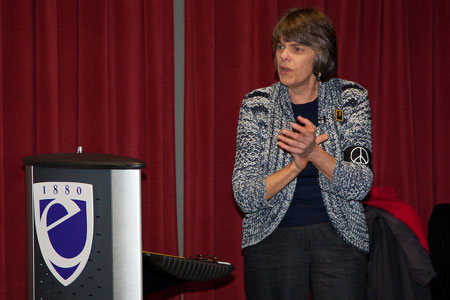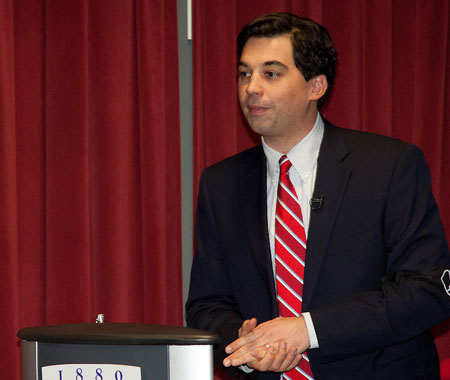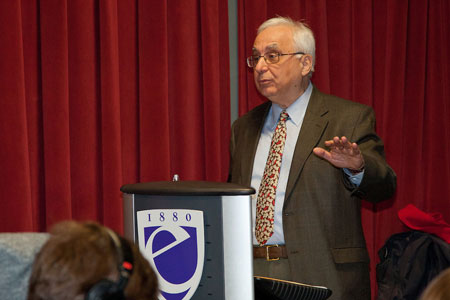Mary Beth Tinker visits Emerson
Student rights advocate Mary Beth Tinker visited Emerson on November 14 to discuss her landmark Supreme Court case, Tinker v. Des Moines (1969). Members of the Emerson community filled Piano Row’s Multipurpose Room to hear Tinker relay the story of the case that helped establish a standard for students’ First Amendment rights in schools.
For two months, Tinker has been on the road for her “Tinker Tour USA,” a project of the Student Press Law Center, visiting schools across the country to share her story.

One of six children, Tinker grew up surrounded by activism. Both her mother and her father, a Methodist minister, were highly active in the civil rights movement, which helped inspire a self-described “shy and timid” Tinker to take up her own cause when the time came.
That time came in Des Moines, Iowa, in 1965 when 13-year-old Tinker and a group of students wore black armbands to school in symbolic protest of the ongoing Vietnam War, both to mourn the dead on both sides and support the Christmas truce proposed by Senator Robert F. Kennedy. Once in school, the students were ordered to remove their armbands, which were deemed a distraction in class. Tinker did, but was still suspended.
Four years and much controversy later, the Supreme Court heard her case and ruled 7-2 in favor of Tinker, finding that the school district had unconstitutionally violated the students’ First Amendment rights. In the much-quoted majority opinion, Justice Abe Fortas wrote that neither teachers nor students “shed their constitutional rights…at the schoolhouse gate.”

As a studious, rule-abiding child, Tinker said she never planned to delve into the world of activism and protest her parents occupied. “That’s something other people do,” she said.
But as the Vietnam War gained momentum and TV news anchor Walter Cronkite reported a growing body count each night, Tinker was moved to action.
“To me, [wearing the armband] was such a small thing to do,” she said. “But as I learned, so much of history is really made by the small things that you do or don’t do.”
Almost half a century after the Supreme Court decision, Tinker shares her story in hopes that today’s youth will be their own activists.
“If you don’t use your rights, you could lose them,” said Tinker. “As we go around on our Tinker Tour, I’ve met so many young people…who are using those rights and who are standing up for them.”

This leg of the Tinker Tour will conclude on November 25 in Missouri, and Tinker will set out for a West Coast tour in the spring.
On November 19, Tinker and her brother, John, will be honored with a locker dedication at the school she was first suspended from for wearing her armband.
Her Emerson visit was sponsored by the Journalism Department. Tinker was introduced to the audience by Professor Emmanuel Paraschos and First Amendment lawyer Jeffrey Pyle.
Categories